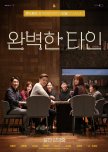Cette critique peut contenir des spoilers
A game that unravels fast
If you like 'Who's afraid of Virginia Woolf', 'The Boys in the Band' or 'Scenes from a Marriage' this should be for you.
Like the aforementioned films Intimate Strangers has a lot on its plate but manages to deal with it in a very careful, mature and profound way.
Some people say despite the one-room-setting it never gets boring. This kind of verbose play-like house-thriller setting is one of my favorite film settings and I have never seen a boring movie come out of it. Human relationships and conflicts, communication and psychology are almost indefinitely interesting themes if done right.
One of the many questions I ask myself is why Ye Jin, a psychiatrist, even suggests playing that game when she know she has something to conceal. Maybe she wants to be found out and provoke a crisis in her marriage because she is in an emotional crisis herself. Too bad for her, because I am pretty sure Suk Ho deliberately ignores what he instinctively knows about his wife. Maybe this is the way these two miscommunicate, between stoking conflict and shying away from it.
There are other moments when characters prevent something from being outed, maybe because they subconsciously know there is something going on, maybe because they don't want to know. In another instance someone ends an embarassing moment for the group that could potentially disrupt the evening and the friendship.
The whole scenario is like a social psychology experiment done in a good way. There is projection, denial, Freudian slips, everything. What I love about it is that the material never chooses the easy road of men are this and women are that, in fact there are many facets of greatness despite all flaws in everyone.
Depending on the topic of discussion the film makes the interesting observation that bonds are built, broken, and re-built, along the lines of time spent together, gender, age, education, social status, belief and personality.
The characters are all multidimensional and feel lived-in, and there are noteable blanks in character introduction, questions are left unanswered, which means more is under the surface than is being shown. This is one more aspect that makes the film very thought-provoking.
There is really nobody among the group without redeeming qualities, nobody I don't like. The only person that annoyed me for the longest time is Se Kyung but even she develops in a way that by the end I deeply empathize with her.
The most fascinating character to me is Tae Su, because once you peel off layer upon layer of brusqueness you learn how far he is willing to go for people, what a decent person he is underneath, a burden he carries by being constantly grouchy.
I like the state each one is left in, from people who are exposed completely, to others who get away with slight scratches, to one who chooses to lay open their secret. It's a very intelligent, tender way to handle the characters. One of the many things to adore about the script.
The sliding-dooresque twist at the end is such a clever idea and makes you ponder which world you want to live in, which option you would choose, it invites philosophical musings about the truth in relationships.
I am trying to gather my thoughts about why I think this kind of no-holds-barred sujet isn't suited for South Korea. They all talk very fast and act so cutesy and the cold hard truth demands time and depth in a way I don't associate with South Korean culture. They constantly hurt each other but gloss over it with the stereotypical tough love attitude.
It's as if the film itself wants to deal with heavy subjects but also doesn't want to alienate any part of its audience so it tries to be provocative while still playing it safe. Maybe this in itself is an indictment of middle class values.
There are no-holds-barred films from South Korea no doubt (e.g. No Regret), but I guess they are more Independent than this one.
This is an ensemble cast with no weak link but I still have to point out how outstanding without being disruptive Yeom Jung Ah is.
Like the aforementioned films Intimate Strangers has a lot on its plate but manages to deal with it in a very careful, mature and profound way.
Some people say despite the one-room-setting it never gets boring. This kind of verbose play-like house-thriller setting is one of my favorite film settings and I have never seen a boring movie come out of it. Human relationships and conflicts, communication and psychology are almost indefinitely interesting themes if done right.
One of the many questions I ask myself is why Ye Jin, a psychiatrist, even suggests playing that game when she know she has something to conceal. Maybe she wants to be found out and provoke a crisis in her marriage because she is in an emotional crisis herself. Too bad for her, because I am pretty sure Suk Ho deliberately ignores what he instinctively knows about his wife. Maybe this is the way these two miscommunicate, between stoking conflict and shying away from it.
There are other moments when characters prevent something from being outed, maybe because they subconsciously know there is something going on, maybe because they don't want to know. In another instance someone ends an embarassing moment for the group that could potentially disrupt the evening and the friendship.
The whole scenario is like a social psychology experiment done in a good way. There is projection, denial, Freudian slips, everything. What I love about it is that the material never chooses the easy road of men are this and women are that, in fact there are many facets of greatness despite all flaws in everyone.
Depending on the topic of discussion the film makes the interesting observation that bonds are built, broken, and re-built, along the lines of time spent together, gender, age, education, social status, belief and personality.
The characters are all multidimensional and feel lived-in, and there are noteable blanks in character introduction, questions are left unanswered, which means more is under the surface than is being shown. This is one more aspect that makes the film very thought-provoking.
There is really nobody among the group without redeeming qualities, nobody I don't like. The only person that annoyed me for the longest time is Se Kyung but even she develops in a way that by the end I deeply empathize with her.
The most fascinating character to me is Tae Su, because once you peel off layer upon layer of brusqueness you learn how far he is willing to go for people, what a decent person he is underneath, a burden he carries by being constantly grouchy.
I like the state each one is left in, from people who are exposed completely, to others who get away with slight scratches, to one who chooses to lay open their secret. It's a very intelligent, tender way to handle the characters. One of the many things to adore about the script.
The sliding-dooresque twist at the end is such a clever idea and makes you ponder which world you want to live in, which option you would choose, it invites philosophical musings about the truth in relationships.
I am trying to gather my thoughts about why I think this kind of no-holds-barred sujet isn't suited for South Korea. They all talk very fast and act so cutesy and the cold hard truth demands time and depth in a way I don't associate with South Korean culture. They constantly hurt each other but gloss over it with the stereotypical tough love attitude.
It's as if the film itself wants to deal with heavy subjects but also doesn't want to alienate any part of its audience so it tries to be provocative while still playing it safe. Maybe this in itself is an indictment of middle class values.
There are no-holds-barred films from South Korea no doubt (e.g. No Regret), but I guess they are more Independent than this one.
This is an ensemble cast with no weak link but I still have to point out how outstanding without being disruptive Yeom Jung Ah is.
Cet avis était-il utile?





















